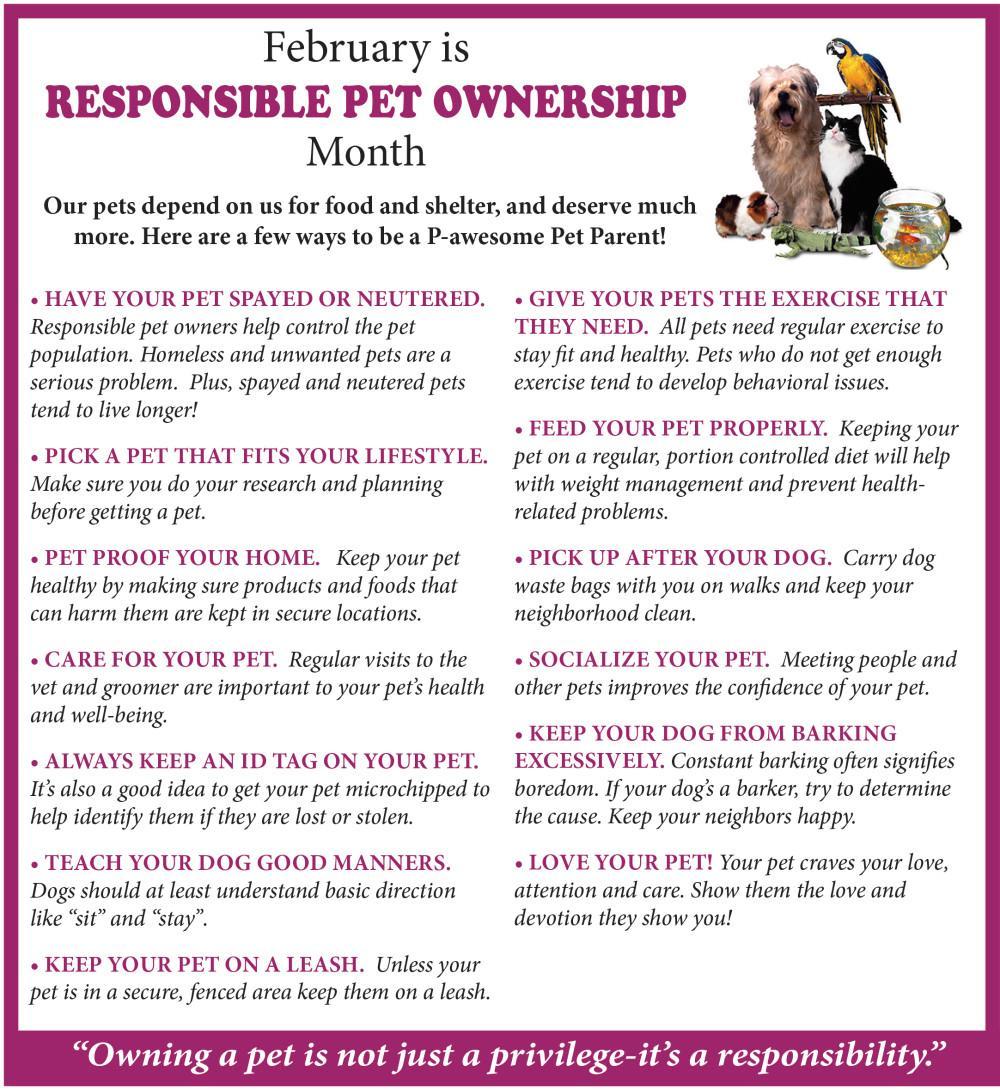In the heart of countless homes across the globe, the bond between humans and their pets transcends mere companionship. These beloved animals bring joy, comfort, and a sense of purpose to our lives, often becoming cherished members of the family. Yet, with this profound connection comes a significant responsibility — the journey of responsible pet care. From understanding the nutritional needs of your furry friend to ensuring their mental and physical well-being, the task can seem daunting for new pet owners and seasoned caregivers alike. As we navigate this intricate landscape, we uncover the essential principles that guide us toward not just being pet owners, but compassionate caregivers committed to our animals’ health and happiness. This article will explore the multifaceted aspects of responsible pet care, illuminating the path toward nurturing a harmonious relationship with our pets while honoring their unique needs.
Table of Contents
- Understanding the Foundations of Responsible Pet Ownership
- Choosing the Right Pet for Your Lifestyle and Environment
- Essential Health and Wellness Practices for Pet Care
- Building a Strong Bond Through Training and Socialization
- In Summary
Understanding the Foundations of Responsible Pet Ownership

At the core of responsible pet ownership lies a commitment to understanding the specific needs of your pet. This starts with choosing the right companion that fits your lifestyle and household dynamics. Different pets come with varying temperaments, exercise requirements, and care needs. For example, a large dog may need ample space and regular outdoor activity, while a cat might thrive in a smaller living environment. Engaging in thorough research before making this lifelong commitment is essential to ensuring a harmonious bond between you and your pet.
Once you welcome a pet into your home, ongoing education and regular assessments of their health and well-being become paramount. Responsible owners should ensure their pets receive routine veterinary check-ups and vaccinations. Additionally, understanding the importance of nutrition and mental stimulation can significantly enhance your pet’s quality of life. A few fundamental practices include:
- Daily exercise – tailor activities to your pet’s breed and age.
- Socialization – expose them to different environments and other animals.
- Training – invest time in obedience and behavior training.
Choosing the Right Pet for Your Lifestyle and Environment

When it comes to selecting a pet, the decision is more than just a fleeting desire; it involves a careful evaluation of your daily routine, living environment, and emotional readiness. Each type of animal has specific requirements that need to be met for them to thrive. For instance, if you live in a small apartment with limited space, consider smaller dog breeds, cats, or even small pets like hamsters or birds. These animals often adapt well to confined spaces and require less exercise compared to larger breeds that need regular outdoor activities. It’s essential to assess your lifestyle and prioritize the needs of the animal, ensuring both you and your future companion will be satisfied.
Another critical aspect in your choice revolves around the time and commitment you can realistically offer. Some pets need more attention and engagement than others. For example, dogs typically require daily walks, socialization, and training, while cats can often entertain themselves. If you’re a busy professional or frequently travel, adopting a pet that demands less interaction might be ideal. Below is a simple comparison table to guide you in choosing the right pet based on your lifestyle:
| Pet Type | Space Requirement | Daily Time Commitment |
|---|---|---|
| Dog | Moderate to Large | 1-2 hours |
| Cat | Small to Moderate | 30 minutes – 1 hour |
| Hamster | Small | 15-30 minutes |
| Fish | Small | 15 minutes (weekly maintenance) |
Essential Health and Wellness Practices for Pet Care
Ensuring the health and well-being of your pet is a multifaceted commitment that goes beyond just providing food and shelter. Regular veterinary check-ups are crucial for early detection of potential health issues and vaccinations that keep your furry friends safe. Additionally, maintaining a balanced diet tailored to your pet’s specific needs is essential. This includes:
- Age-appropriate nutrition: Kittens and puppies require different nutrients than adult or senior pets.
- Portion control: Overfeeding can lead to obesity, which is a prevalent issue in pets.
- Special dietary needs: Some pets may require special diets for allergies or health issues.
Another vital aspect of pet care involves providing ample opportunities for physical activity and mental stimulation. Regular exercise not only aids in preventing obesity but also helps in promoting good behavior and mental health. Consider incorporating the following into your routine:
- Daily walks: A consistent schedule fosters bonding and keeps their energy levels in check.
- Interactive toys: Puzzles and treat-dispensing toys can keep them engaged when you’re not around.
- Socialization: Exposure to other pets and new environments is key to a well-adjusted pet.
| Health Practice | Frequency | Benefits |
|---|---|---|
| Veterinary Check-ups | Annually | Prevention of illness |
| Vaccinations | As recommended | Protection from diseases |
| Exercise | Daily | Weight management, behavioral health |
Building a Strong Bond Through Training and Socialization
Training and socialization are essential pillars in developing a healthy relationship with your pet. When you dedicate time to teaching your furry friend basic commands, you’re not just imparting knowledge; you’re also establishing trust and mutual respect. Whether it’s through simple obedience tasks or engaging in fun activities, the act of training becomes a powerful tool for communication. It allows your pet to understand expectations and fosters a sense of security in various environments. Think of training sessions as playtime where learning and bonding go hand in hand.
Socialization plays a crucial role in your pet’s development and overall happiness. By exposing your pet to different people, animals, and environments, you help them become well-adjusted companions. To enhance social experiences, consider incorporating a mix of the following activities into your routine:
- Group classes: Enroll your pet in dog training classes where they can interact with peers.
- Playdates: Organize informal meet-ups with other pet owners to allow for casual social interactions.
- Community events: Attend local pet-friendly gatherings to introduce new sights and sounds.
To keep track of your pet’s progress and experiences, a simple record can be beneficial. Here’s a straightforward layout:
| Date | Activity | Observations |
|---|---|---|
| 01/15/2023 | Group Class | Improved focus, enjoyed meeting new friends! |
| 01/20/2023 | Dog Park | Played well, socialized with various breeds. |
| 01/28/2023 | Community Fair | Curious, encountered different sounds and people. |
By embracing training and socialization, you lay the foundation for a strong bond that enhances the quality of life for both you and your pet, making every shared experience a step towards a deeper connection.
In Summary
As we conclude our exploration of responsible pet care, it becomes clear that this journey is not merely about the act of caring for an animal; it’s about embarking on a partnership founded on trust, respect, and mutual benefit. Each decision we make—from the food we choose to how we engage in play—shapes the lives of our pets and the bonds we share with them.
Through our discussions, we’ve unveiled the intricate layers of pet ownership, emphasizing the need for education, empathy, and commitment. Whether you are a seasoned pet owner or contemplating welcoming a new furry friend into your home, remember that the path to responsible pet care is a continuous learning experience. It requires patience, understanding, and a willingness to adapt to the ever-evolving needs of your companion.
As you move forward in this journey, embrace the challenges and joys that come with it. Seek knowledge, share experiences, and foster a community where responsible pet care is valued and prioritized. By doing so, you not only enhance the quality of life for your own pet but also contribute to a more compassionate society that values the welfare of all animals.
responsible pet care is a reflection of our values and our commitment to nurturing life. May your journey be filled with love, learning, and countless moments that reinforce the unique bond between you and your beloved animal. Thank you for joining us on this exploration; together, we can make a meaningful difference.


